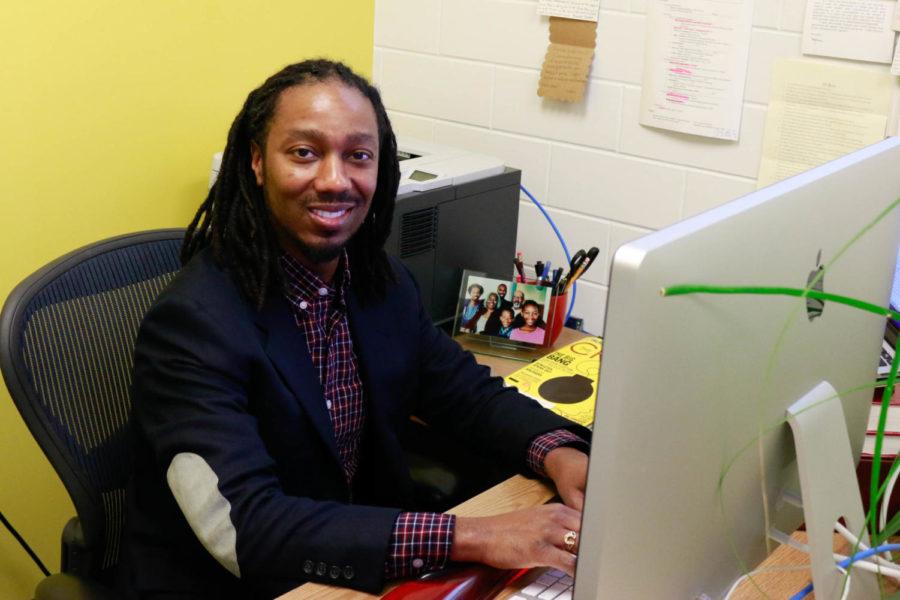Iowa State professor makes difference in lives of black students on campus
Jack MacDonald/Iowa State Daily
Brian Burt, who got a degree in Secondary English from Indiana and a doctorate at Michigan, now continues his research of African American students at Iowa State. Dr. Burt has focused his research mainly on engineering students, but hasn’t been afraid to go outside that population.
February 19, 2017
One Iowa State professor who acts as a mentor to students of color is attempting to make the college experience more inclusive to diverse populations.
Starting as an undergraduate pursuing music education, Brian Burt switched gears to a degree in secondary English at Indiana University Bloomington, then higher education, eventually receiving a doctorate in it at the University of Michigan.
Now, Burt is at Iowa State University and is continuing his research on black students, especially those in engineering.
As an undergraduate at Indiana, his interest changed from music education to higher education because many of his mentors were graduate and doctoral students
“[They] opened my eyes to the possibility of being a graduate student myself,” Burt said. “… it was early exposure to the field [of higher education].”
As an undergraduate, Burt attended National Association of Student Personnel Administrator conferences, which are usually attended by graduate students and professionals. The early exposure to higher education conferences helped him in numerous ways.
“[It] was invaluable,” Burt said. “It exposed me to … the importance of doing professional development, but also just completely expanded my networks.”
Now as a professor, he encourages his students to visit conferences to help them become comfortable and build relationships that will help them in the future.
When beginning his research, Burt became interested in graduate students’ experiences for a handful of reasons. He was invited to a research group conducted by Sharon Fries-Britt, who has become his mentor.
“Brian had an incredible energy and willingness to learn,” Fries-Britt said.
During his first year, Burt struggled with the transition and asked himself whether he made the right choice, if he was even supposed to be in graduate school and if he should just return to Indiana, where he had previously found success.
Fries-Britt helped him work through the transition from Indiana University Bloomington to the University of Maryland, College Park.
“Even though I thought I was drowning, she invited me to join her research group,” Burt said. “At that time, it was [composed] of her, several doctoral students and then me, a master’s student.”
The research focused on successful black and latino physicists, which was the first time he had studied minority graduate students.
“[That] planted the earliest seed of a research agenda that I didn’t even know was on the horizon for me,” Burt said.
Fries-Britt continues to be a mentor and has co-authored book chapters with Burt. Burt refers to her as “one of my all-time favorite professors.”
After graduating from Maryland, Burt attended the University of Michigan for his doctoral degree and started his research, which focused on black graduate students in engineering.
His research at Michigan concluded that it was much harder for black males, and he thinks this could be applied to Iowa State as well.
“But it’s not an Iowa State thing,” Burt said. “… It’s really not about the institution; it’s about the tradition and this legacy of science that people keep on perpetuating in very negative and unhealthy ways.”
Burt and his team are trying to help institutions like Iowa State and other universities stop microaggressions and the alienation of black students.
Some black students gather and may get blamed for segregating themselves from a group, but they are really getting together with someone they can relate to. Instead of criticizing them, Burt said, let them embrace that and set up safe places for minority students to gather.
Burt has also pointed out that the environment is more difficult for black students because of what they see in the buildings, classrooms and textbooks.
“A white student will not only see their white peers, they will also see white faculty members, they’ll see white administrators,” Burt said. “In the textbooks, everything is from the white engineers … so for a black person they don’t see that.”
As an assistant professor, Burt has been a mentor to students of color who come to him.
“I think that [being a mentor] is an unwritten benefit of being a faculty member of color,” Burt said. “You will always be sought out by other students of color, or even people from other marginalized or oppressed populations.”
Burt’s advice to underrepresented students is simple.
“Know that you’re not alone,” he said. “Every single person of color has likely felt the same way. And because you’re not the only one, don’t feel like you can’t tell somebody or talk to somebody about it.
“Actively seek out community, and if there’s not community in your … program, find it in another program, or find it somewhere on campus. [There’s] someone just like you, who needs you as much as you need them, but it’s going to take some work.”
After his current projects are completed, Burt wants to focus on female black students and Latino students. His current works focus on STEM students, but he hopes to broaden the scope of his research.
In the future, Burt anticipates that the climate will change for students of color to be more inclusive.
“I would hope that … we as a higher education intellectual community, that we have expanded how we think about merit, and who gets in and who doesn’t get in college,” Burt said. “I hope that when people are choosing majors like STEM … that we also have more nuance and more complex ways of thinking about who can contribute to STEM.”
Burt has applied and received many grants and scholarships to fund projects like the National Science Foundation’s Early Faculty CAREER Award and the National Academy of Education/Spencer Postdoctoral Fellowship, which are both very selective.
















